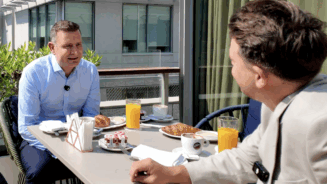Quant allocation
NN Investment Partners is the asset manager of NN Group, a publicly traded company listed on Euronext Amsterdam since 2014. It was formerly part of the multinational banking and financial services group ING. After 2008, the asset management arm was spun off and ING no longer holds any stake in it.
Schop joined the company at the end of the ’90s when it was ING and the tech fund already existed. NNIP’s Information Technology fund, launched 12 January 1998, is domiciled in Luxembourg and has both euro and USD share classes.
At the beginning of 2015, the fund restructured its investment process to give a greater role to quantitative factors in what had been a traditional bottom-up stock selection system. This is when Schop joined the tech team.
“There’s an adage that says, ‘never buy cheap technology stock’, but we’ve found out that’s not true,” says Schop. “If you buy cheap technology stock that has momentum they can perform very well. That’s why, next to the fundamental analyst bottom-up research input, we added a quant factor model, where we rank the stocks according to momentum, value and quality.”
The fund also screens stocks for environmental, social and governance factors because, as Schop says: “Sustainability is very important, and in the long run, sustainable companies will outperform companies that are not sustainable.”
This is one factor behind the fund’s allocation to Visa. The financial service group is set to benefit from the growing trend of cashless transactions and is well positioned to grow in Europe after the acquisition of its separately owned European counterpart.
The NNIP fund is benchmarked against the MSCI World Information Technology Index, which gives it a very heavy weighting to the big US technology companies. In fact, over 80% of the fund is in US equities, followed by nearly 10% in Japan and just under 5% in Europe.
The USD units of the fund have posted a rise of 22.1% in the six months to the end of May and a rise of 57.7% cumulatively during the past three years, all net of fees.
The top five holdings at the end of May were Apple, Microsoft, Alphabet, SAP and Accenture. The fund has about 30 stocks in the portfolio, in total, and Schop does not expect that to change in the near future. “With 30 stocks, you can build a diversified portfolio, where you can play the main themes,” he says.
He adds that the top three holdings in the fund are unlikely to change because, under Ucits rules, the maximum amount of a stock that can be in a portfolio is 10%, and they are already around that level.
“We cannot go much higher, we probably will not go much lower, so those – Apple Microsoft, Alphabet – are relatively stable holdings in the fund.”
The fund is not running a buy and hold strategy. Schop favours cheap technology stocks that have momentum.
He says: “If momentum fades, and that’s not only price momentum but also earnings momentum, then these stocks will go out of the portfolio.”




